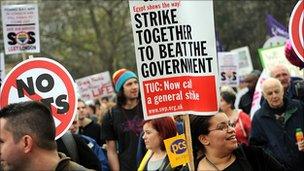Are we facing a summer of discontent?
- Published

More than 250,000 people attended a TUC march in London against public spending cuts
The papers are awash with warnings of a "summer of discontent" due to public sector strike action over pension changes, job cuts and pay freezes. But how bad is it?
Suddenly strike action is back in the headlines, threatening to bring doom and gloom to British summertime.
A 24-hour co-ordinated strike - due to be staged on 30 June - is now definitely on the cards.
The PCS union - whose 300,000 members include court and job centre staff, border, customs and immigration officers, air traffic controllers and police support staff - has voted in favour of a walkout.
They will be joined by two teachers' unions - the National Union of Teachers and the Association of Teachers and Lecturers, which have a combined total of about 450,000 members - which have decided to take action at thousands of schools in England and Wales on the same day.
Other unions are waiting until talks between the government and union leaders - due to culminate in a final meeting on 27 June - have taken place.
But Dave Prentis, the general secretary of the UK's biggest public sector union, Unison, has warned that the union is "on the road to industrial action" over changes to public sector pensions.
'Civil disobedience'
Mr Prentis said Unison would ballot its 1.3 million members, who work in areas including local government, health care, education and the voluntary sector, on strike action if no agreement with ministers was reached.
The government has said it is "totally committed" to the talks and any co-ordinated strikes would be a "mistake".
Business Secretary Vince Cable has warned co-ordinated strike action could lead to tougher union laws - something Mayor of London Boris Johnson and the CBI have already called for.
In response, the union GMB - which has 700,000 members and represents workers across a range of industries in both the private and public sectors - has threatened a huge civil disobedience campaign if the government tries to change the rules on striking.
But not all public sector professions can - or want to - strike. It has been illegal for the police to strike since 1919, when the Police Act was first established.
And although a British Medical Association spokesman said feelings were "running high" because the NHS pension scheme was under threat and doctors were "essentially being told to work longer, and pay up to twice as much, for a far worse pension", he said industrial action was "only ever a last resort".
"At the moment, what we are seeking is reasonable dialogue with the government," he said.
Strength in numbers
So how likely is widespread industrial unrest - and are we in for a summer of discontent?
Gregor Gall, professor of industrial relations at the University of Hertfordshire, said talk of a summer of discontent was "verging on the preposterous".
"At the moment we are looking at one day of action on 30 June, and there's due to be a strike on the Underground later this month - so we are not looking at a lot.
"The use of the term 'summer of discontent' - relating to what happened in 1978 and 1979 - has no basis," he said.

Ministers have said any co-ordinated strike action would be a "mistake"
In fact, he said, strike action over the last couple of years had reached the lowest level since government records began in 1981, with 2010 and 2009 being the first years with less than a 100 strikes a year.
What was slightly more unusual about this summer, he said, was the co-ordinated action.
"It has happened - the best example is probably 2006 when unions took co-ordinated action over pensions, which was successful - but it's still not very common.
"Looking back to 1978-79, there were a large number of strikes at the same time, but they were not deliberate, or explicitly co-ordinated," he said.
He thinks this level of co-ordination is down to two reasons: firstly, because the unions are not as strong as they used to be - so they want strength in numbers; secondly, because everyone is affected by the same issues.
"Normally people are affected by different issues at different times, but with the public sector pay freeze and pensions there is a commonality of interest so people are singing off the same hymn sheet.
"The other factor is the changes being proposed to pensions are without precedent, in terms of asking people to work longer, get lower pay, but also get less in retirement compared with their current scheme," he said.
Autumn of discontent?
Prof Gall said the reason the private sector - where just under 15% of employees are in unions - was not really affected was because the changes to pensions had largely already happened.
"They also have many more employers, so it is much more difficult to co-ordinate action, even if there is a will," he said.
Although Prof Gall said the talk of a summer of discontent was far-fetched, he added that if the unions and the government failed to come to any agreement on 27 June, and more unions' ballots resulted in action, "there may be some basis for saying there could be an autumn of discontent".
There was also an open question as to what would happen if the government took the step of changing the legal regulation of strikes, he said.
"If the government changes the law, the unions will see it as changing the goalposts and an active political retribution - and the government are likely to end up with more egg on their face," he said.
- Published15 June 2011
- Published13 June 2011
- Published10 March 2011
- Published7 June 2011
- Published6 June 2011
- Published26 March 2011